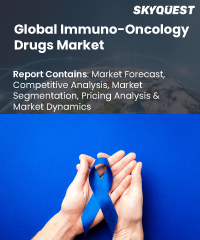
Report ID: SQMIG35I2108
Skyquest Technology's expert advisors have carried out comprehensive research and identified these companies as industry leaders in the Immuno-Oncology Drugs Market. This Analysis is based on comprehensive primary and secondary research on the corporate strategies, financial and operational performance, product portfolio, market share and brand analysis of all the leading Immuno-Oncology Drugs industry players.
The immuno-oncology (IO) drugs market is characterized by intense competition, with numerous companies dedicating significant resources to research and development efforts aimed at introducing novel IO drugs to the market. To gain a competitive edge, companies are investing in advanced technologies, collaborations, and strategic partnerships with other companies and academic institutions to improve their product offerings. Additionally, companies are also exploring innovative business models to reduce development costs, streamline manufacturing processes, and enhance the affordability and accessibility of IO drugs to patients. This intense competition in the IO drugs market is driving innovation, accelerating drug development, and improving patient outcomes.
immuno-oncology (IO) drugs market is currently dominated by a handful of major players. However, this is expected to change in the coming years as more companies seek to offer IO drugs services to meet the growing demand for cancer treatments that offer potential benefits to patients. As the market expands, established companies in the cancer treatment industry, as well as emerging start-ups, are increasing their investments in research and development to create novel IO drugs therapies. This shift towards greater competition is being fueled by the increasing recognition of the potential benefits of IO drugs, including their ability to offer more targeted and personalized treatment options to cancer patients. As more companies enter the IO drugs market, patients can expect to see a broader range of treatment options and increased innovation in the field. Collaboration and partnerships between companies may also be necessary to accelerate the development and commercialization of new Immuno-Oncology Drugs treatments.
REQUEST FOR SAMPLE
Want to customize this report? This report can be personalized according to your needs. Our analysts and industry experts will work directly with you to understand your requirements and provide you with customized data in a short amount of time. We offer $1000 worth of FREE customization at the time of purchase.
Feedback From Our Clients

Report ID: SQMIG35I2108
sales@skyquestt.com
USA +1 351-333-4748